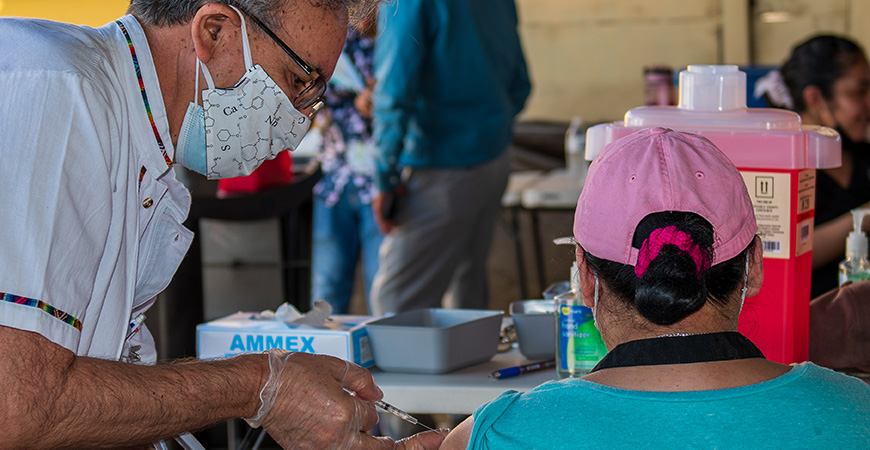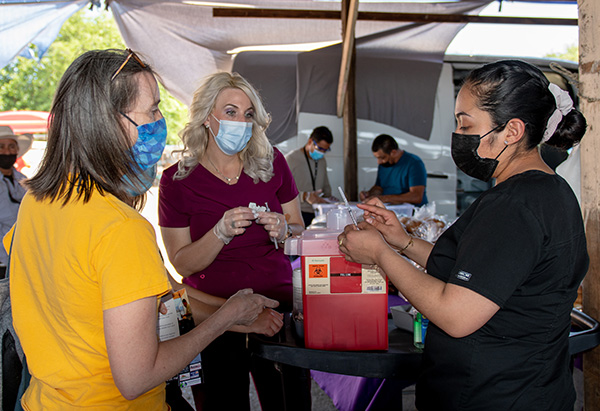
As news headlines continue to focus on seeing the light at the end of the pandemic tunnel, the coronavirus continues to spread across the globe. As of May 18, California has recorded more than 3.6 million confirmed cases of COVID-19, resulting in over 61,500 deaths, according to the California Department of Public Health.
So far, more than 34.8 million vaccines have been administered in the Golden State, health officials reported. But the task of getting Californians to roll up their sleeves for the inoculations has been met with some obstacles. A new report by the Share, Trust, Organize, Partner COVID-19 California Alliance (STOP COVID-19 CA) — a statewide community-partnered collaborative funded by the National Heart, Lung and Blood Institute — addresses the challenges and solutions faced by California communities related to COVID-19 vaccines.
Public health Professor Nancy Burke leads the UC Merced site of the statewide collaborative of 11 academic institutions and over 75 community partners. The group works to conduct research, create training materials for community leaders and develop policy recommendations to increase accessibility of vaccine trials and vaccinations.
From September 2020 through February 2021, members of the collaborative met to bring together findings on vaccine accessibility and hesitancy from individual and focus group interviews, town halls, community advisory board meetings, listening sessions, surveys and other sources of data collection from across the state.
In the report, researchers conclude that racism and other social inequities are the primary influencers of vaccine inequities among marginalized communities in California. Some of the social determinants of health listed in the report include historical abuses not being sufficiently acknowledged and remedied, documentation requirements and a fear of deportation and mistreatment, as well as impediments to scheduling and receiving the vaccine such as transportation and the possibility of lost wages for taking time off from work.
The report also found that lack of information, misinformation and disinformation reinforce hesitancy initially established by racism and other social inequities and make it difficult to access vaccines. Not having information in diverse languages, getting confusing and conflicting information from experts, as well as being unsure of who to trust (doctors, scientists, community leaders, social media, etc.) make people think twice about receiving the vaccine.
Solutions posed to increase vaccine uptake include acknowledging and dismantling past and present injustices, prioritizing underserved populations in the vaccine rollout, providing timely, accurate and quality information to diverse populations in culturally sensitive ways and providing transportation to vaccine sites, among others.
The report also lists community engagement as an important piece of adequate pandemic response. Researchers explained that marginalized communities must be at the forefront of planning, outreach and implementation to ensure vaccine equity for those most impacted in California. This includes sharing success stories of Black, Latino and other people from marginalized groups; providing education on the science of vaccines, past scientific abuses and changes made to research since; and listening to community leaders to identify appropriate and sustainable strategies.
“We know from research that the messenger is often more important than the message," Burke said. "In the context of so much mis- and dis-information, trusted community members and leaders play essential roles in providing culturally and linguistically appropriate and resonant information about COVID-19 testing and vaccination. The CEAL program is an example of the National Institutes of Health acknowledging the centrality of community engagement to pandemic response and the need to support the relationships at the heart of that work.”
Burke works with Cultiva La Salud, United Way Merced County, Golden Valley Health Center and Merced County Public Health Department to address these challenges via a messaging campaign featuring local residents and leaders, and vaccine “pop-up” events at the Merced County flea market. On May 1, for example, this team walked from booth to booth administering vaccines to flea market vendors and shoppers. Team members will return on the 22nd to offer the second shot.
Burke and Claudia Corchado, director of Cultiva La Salud, have shared the report findings, highlighting those relevant to the region, and at the state and the national levels as well. Statewide findings are informing the Governor’s Equity Framework.
People looking for the nearest location to get the COVID-19 vaccine can visit vaccines.gov or call (800) 232-0233. In Merced County, residents can dial (209) 203-0408 to receive help with scheduling vaccination appointments from UC Merced student volunteers. Andrea López, Ph.D., a postdoctoral researcher on the STOP COVID-19 study, worked with Burke and Corchado to establish this free and confidential hotline. She trained UC Merced Public Health Society members, bilingual in Spanish, Hmong, Punjabi and English, to walk callers through the process of vaccine scheduling.
"Our goal is to help reduce the barriers people may face to getting vaccinated against COVID-19," López said. "UC Merced student volunteers are ready to help residents find and schedule vaccine appointments. The call line is an opportunity for us to support residents and a step towards resuming activities and reopening the community."






